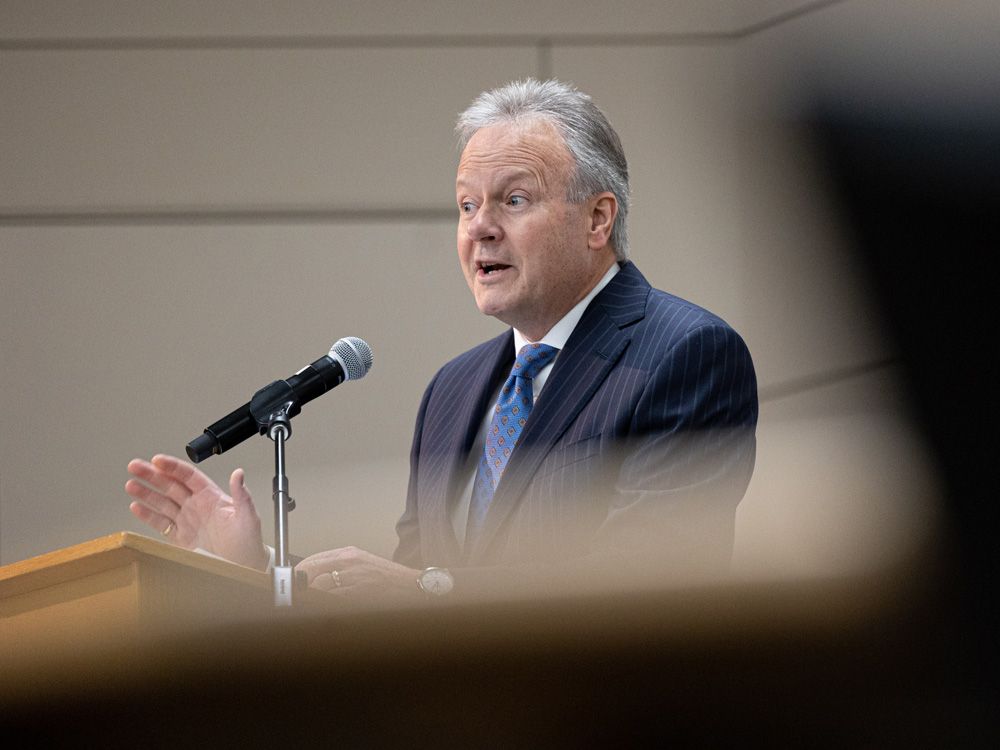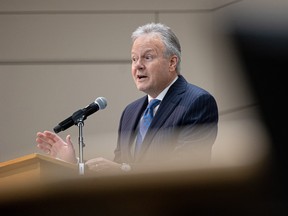Article content
Former Bank of Canada governor Stephen Poloz’s tenure coincided with the emergence of two economic challenges that initially seemed like anomalies, but now appear to be permanent features.


Former Bank of Canada governor points to a lack of clear policy

Former Bank of Canada governor Stephen Poloz’s tenure coincided with the emergence of two economic challenges that initially seemed like anomalies, but now appear to be permanent features.
Poloz took the helm of the central bank in June 2013, just in time to watch the loonie plummet from 97 cents against the greenback to 71 cents by the start of 2016, as the country grappled with the ripple effects of a serious recession in Alberta amid an oil downturn.
Then, as the country began to shake off the effects of the collapse in oil prices, the labour market started to become unusually tight, as the jobless rate dropped to historic lows and the vacancy rate steadily climbed.
Both trends accelerated in the aftermath of the COVID recession, as job vacancies climbed to record levels and the dollar continued to tread water, despite a surge in commodity prices. That matters because a persistently high vacancy rate and a weak dollar will complicate Ottawa’s efforts to tame inflation, as an inadequate supply of workers will put upward pressure on wages, while an unfavourable exchange rate will make imports more expensive.
Poloz, who left public service when his term ended in 2020 and now serves as a special adviser at law firm Osler, Hoskin & Harcourt LLP, sees a link between these two problems. He pointed to a lack of clear policy as a commonality, arguing that more transparent language could begin to unwind some of the issues policymakers are struggling with.
Consider immigration first.
Poloz said that for high immigration targets to provide a reliable solution to a tight labour market, the federal government will have to make the immigration process more clear and streamlined to attract more business investment.
“We need to still get our act together and make sure it’s welcoming, it’s easy instead of painful, the processes need to be better,” Poloz said in an interview following a fireside chat at an event hosted by the Portfolio Management Association of Canada in Toronto on Nov. 16. “How does a business grow if they can’t get workers?”
We need to still get our act together
Stephen Poloz
Poloz isn’t alone in thinking the immigration system needs an overhaul. Victor Dodig, chief executive officer of the Canadian Imperial Bank of Commerce, flagged the problem in an October opinion piece for the Financial Post, urging a number of changes, including faster professional accreditations and recognition that housing affordability is probably deterring many talented immigrants from choosing Canada as a destination.
And Tiff Macklem, Poloz’s successor, used a recent speech to point to ambitious immigration targets as a way to tackle structural labour shortages stemming from Canadians retiring. More specifically, he pointed to the Liberal government’s recently announced targets of welcoming 1.4 million immigrants over the next three years as well as “selection tools” to more easily target sectors in need of labour.

Poloz said the problem is bigger than that. “Sounds good on paper,” he said. “But what could go wrong with it? Canada is rapidly developing a reputation as a place that’s really, really expensive to land in, and so I think that’s a worry.”
While home prices have eased from their pandemic highs, cities such as Toronto and Vancouver are among the least affordable cities in the world. On top of that, rent rates have shot up, with the average price of a one-bedroom apartment in Toronto jumping 20.4 per cent to $2,481 compared to a year ago.
Poloz also highlighted a lack of funding towards post-secondary education institutions, which have often acted as an important immigration tool in turning foreign students into citizens, and the lack of collaboration between universities and the federal government, as additional flaws. Poloz added that he expects other countries are grappling with a worker shortage and that the stakes are high to become more competitive with immigration policies.
If companies can’t get workers, they’re not going to make an investment
Stephen Poloz
It’s a problem Canada can’t afford to get wrong if it wants to maintain its current standard of living. Poloz drew a parallel between Canada and Japan in the early 1990s in his book, The Next Age of Uncertainty. He wrote that Japan had gone from an economic powerhouse in the late 1980s to a laggard in the ‘90s, in part because an aging population and a low immigration rate brought economic growth to a crawl.
Canada isn’t Japan when it comes to an aversion to immigration, but there are obstacles to overcome. Poloz said businesses have sometimes come under criticism by pursuing temporary foreign workers and not giving the job to a Canadian, even though employers were unable to find Canadians to take the jobs.
“If companies can’t get workers, they’re not going to make an investment,” Poloz said.
Earlier this year, Macklem said the Canadian dollar’s lost link to oil is related to faltering investment in the energy sector, as international investors are no longer lining up to exploit the oilpatch, in part because the shift to greener energy will diminish demand for Canadian oil.
Poloz agreed with the assessment, adding that the federal government’s push towards net-zero policies has been creating more uncertainty among investors who may have otherwise put their funding towards the oilpatch. Capping oil and gas sector emissions and achieving net-zero emissions by 2050 has been a promise in the Liberal government’s election platform.
It’s an ambitious goal that has left the energy sector less certain about the future of energy infrastructure projects in Canada. Poloz said policymakers providing more clarity on how the federal government plans to pursue its climate goals and work with the energy industry could mitigate some of the petrocurrency disconnect issues. In turn, that might boost the exchange rate, which would relieve some of the pressure on Macklem to raise interest rates because the stronger currency would do some of the work of combating inflation.



“I just think giving some daylight to that might help restore that normal relationship between the loonie and the energy sector,” Poloz said. “Right now, there’s too much uncertainty for it to have that (relationship).”
Poloz added that the issue of energy security could re-enter the conversation, setting a course to 2050 with the plan of having fossil fuels available as a backup source of energy for renewables, providing more wiggle room for the oil industry to play a role in the transition.
“That’s not the same as saying ‘Just leave them in the ground,’” Poloz added. “It’s a really big difference.”
• Email: shughes@postmedia.com | Twitter: StephHughes95
24World Media does not take any responsibility of the information you see on this page. The content this page contains is from independent third-party content provider. If you have any concerns regarding the content, please free to write us here: contact@24worldmedia.com

A Brief Look at the History of Telematics and Vehicles

Tips for Helping Your Students Learn More Efficiently

How To Diagnose Common Diesel Engine Problems Like a Pro

4 Common Myths About Wildland Firefighting Debunked

Is It Possible To Modernize Off-Grid Living?

4 Advantages of Owning Your Own Dump Truck

5 Characteristics of Truth and Consequences in NM

How To Make Your Wedding More Accessible

Ensure Large-Format Printing Success With These Tips

4 Reasons To Consider an Artificial Lawn

The Importance of Industrial Bearings in Manufacturing

5 Tips for Getting Your First Product Out the Door